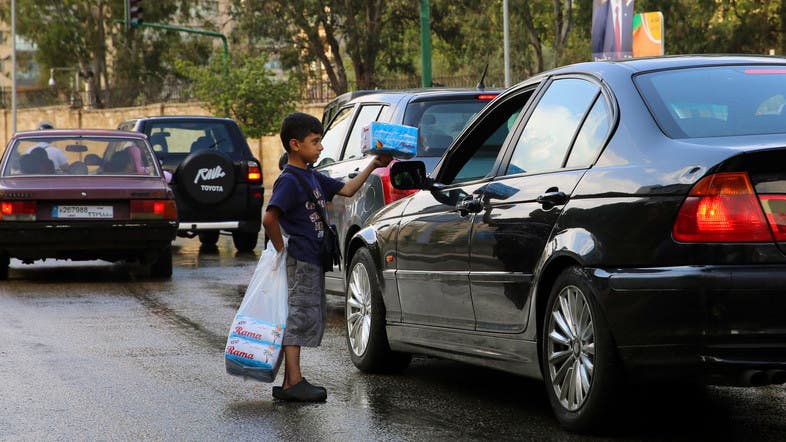Haytham Mahmoud, Special to Al Arabiya English
For a long time, Lebanese people have known Souq al-Hamideye,
Damascus’s most famous popular market, as a place where they used to
shop for cheap goods. Now this market is in Beirut’s southern suburb, where Syrian refugees have launched a duplicate. “This
is one way to feel at home,” one tenant of a shop in the place said,
“we target Syrians like us with our cheap goods,” he added. With
the large scale inflow of refugees, now at 1.5 million – around a third
of tiny Lebanon’s population – the scene of Syrian workers in Lebanese
shops is familiar these days, with employers trying to adjust their
businesses to cope with difficult economic conditions.
Other
Syrian refugees are starting their own small businesses in the country
such as grocery shops, bakeries, mechanical repair and carpentry
workshops. The new source of low cost
labor has dramatically affected unemployment rates. Around a quarter of
Lebanese are believed to be unemployed.
The
resigned labor minister Sej’aan Qazzi mentioned recently that 36
percent of Lebanese youth are unemployed and 47 percent of university
graduates do not find suitable jobs in a market which creates only 4,000
vacancies annually – compared to 32,000 graduates.
The
ministry continuously warned companies against firing Lebanese
employees and replacing them with foreign workers, particularly Syrians.
A crisis cell was established last year to supervise the implementation
of the labor law.
In several statements
the former labor minister expressed fear over the impact of the Syrian
workers on the local unemployment rates. Around 170,000 Lebanese live
below the poverty line.
Most refugees work
in informal, short-term and ad hoc jobs, usually for three to four days
at a time before they have to look for another job. They usually take
whatever available work regardless of their qualifications and skills.
A
qualitative survey conducted by non-governmental organization Oxfam and
the American University of Beirut estimated that most Syrian refugee
households in Lebanon generate less than $5,000 per year, but some earn
up to $8,000, due to larger household sizes.
The
study considered that a five-member Syrian refugee household needs an
annual income of $7,800 to live above the poverty line. As such, it
noted that the current typical annual income of a Syrian refugee
household is 30 percent lower than the poverty line and is lower than
the official minimum annual wage of $5,400 for Lebanese citizens.
The survey indicated that the income of Syrian refugee households
includes a daily wage and humanitarian assistance, which accounts for
about 40 percent of the annual income for most refugees. This means the
actual income earned from labor market participation is about $3,000 per
year.
Changed market
Syrian refugee households spend about a quarter of their income on buying food from the market.
Asked
how the Syrian refugee crisis affects the Lebanese labor market, Khalid
Abu Ismail, chief of the economic policy section at the ?United Nations
Economic and Social Commission for Western Asia, said that the Lebanese
labor market had been affected by regional instability, low oil prices
and the Syrian conflict next door.
“The
Syrian refugees can have an accentuating impact on this reduced demand
by offering work at a lower than average wage; however, not all Lebanese
are going to be impacted,” Ismail said.
“First
because high professionals among the Syrians did not come to Lebanon in
large numbers and those who did already emigrated to other
destinations, also because for the Syrian professionals it is difficult
to work in an informal economy setting.”
He
stressed that “the pressure has come from low skilled Syrian workers
who are competing with their equivalents in Lebanon. But since most of
these jobs are being undertaken by non-Lebanese, the negative impact on
Lebanese will be rather minimal.”
The
Lebanese economy could stand to benefit from Syrian refugee workers “if
it proposes suitable development projects with positive spillover
effects on the both local community and the refugees,” the official
said, citing the example of lucrative agricultural and industrial
projects in Lebanon’s north.
There’s also the issue of work permits for Syrian refugees in the country.
Matthew
Saltmarsh, Senior Communication Officer at the “United Nations High
Commissioner for Refugees” (UNHCR), said “since the start of last year
the Lebanese government has changed the residency requirements for
Syrian refugees and part of the new regulations is a pledge not to
work.”
“We are working with the Lebanese
government to ease these restrictions on the renewal of their residency,
and we recommend opening specific sectors where there is no competition
with Lebanese and more specifically in agriculture construction and
cleaning services or generally low paying jobs”.
Last Update: Friday, 8 July 2016 KSA 17:14 – GMT 14:14




